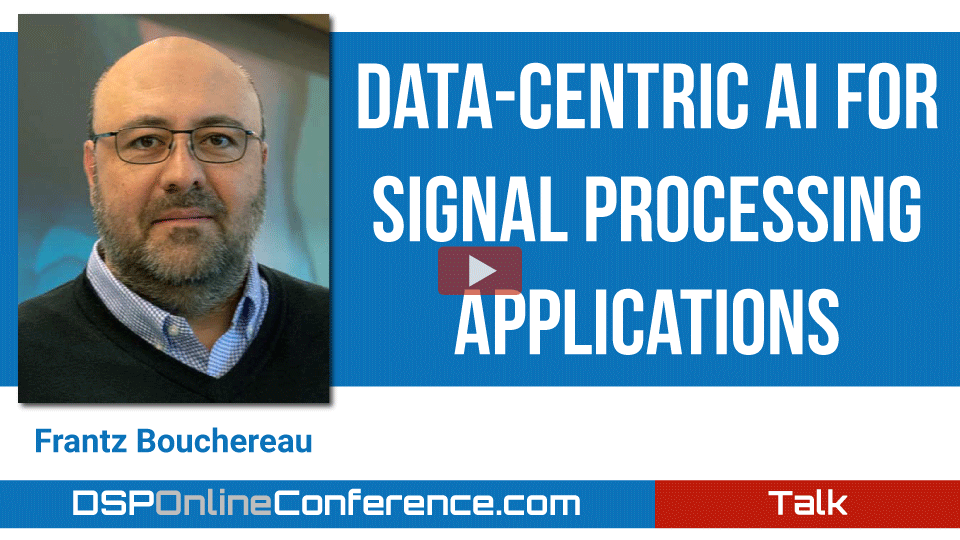Home > On-Demand Archives > Talks >
Data-Centric AI for Signal Processing Applications
Frantz Bouchereau - MathWorks - Watch Now - DSP Online Conference 2021 - Duration: 43:36

Model-centric approaches to solve AI problems have been dominant in applications where large and high-quality datasets are available. Such approaches aim to improve model performance through the development of more complex architectures.
In signal processing applications, where data is usually scarce and noisy and where advanced models and architecture experts are hard to find, a potentially more fruitful approach is a data-centric one that focuses on improving the data to make simpler network architectures perform better. The idea is to enhance signal data by improving its labels, removing noise, and reducing variance and dimensionality. This idea can be extended to include transforming signals into domains where key features become more prominent and easier to distinguish.
In this talk I go over various examples that follow a data-centric approach to improve AI-model performance. I show how signal processing techniques like time-frequency transformations, filtering, denoising, multiresolution analysis, data synthesis, and data augmentation can be used to obtain state-of-the-art results with simpler AI architectures in the solution of signal classification, signal regression, and anomaly detection problems.
This guide was created with the help of AI, based on the presentation's transcript. Its goal is to give you useful context and background so you can get the most out of the session.
What this presentation is about and why it matters
This talk presents a practical, data-centric strategy for applying modern AI to real-world signal processing problems. Instead of chasing ever-larger neural networks, the speaker shows how careful signal conditioning, feature extraction, domain-aware transforms, and synthetic/augmented data can make simpler models reach state-of-the-art performance. The examples span ECG classification and segmentation, seismic/hydrophone facies mapping, audio anomaly detection, radar micro-Doppler classification, and communications modulation recognition.
Why it matters: in many engineering settings the data are scarce, noisy, or expensive to label. Deep learning success stories for images often assume millions of labelled samples and large teams of ML specialists. For practicing signal-processing engineers, the pragmatic route is to improve the data: remove nuisances, expose discriminative structure, reduce variance and dimensionality, and synthesize realistic examples. The result is faster models, easier explainability, and solutions that are practical to develop and deploy in industry.
Who will benefit the most from this presentation
- Signal-processing engineers and applied researchers who want to add AI methods to their toolbox without becoming deep-learning specialists.
- Students learning DSP who want to see practical AI+signal-processing workflows and why preprocessing matters.
- Practitioners in domains like biomedical signals (ECG/EEG), audio/acoustics, radar, communications, and geophysics who face small or noisy datasets.
- Engineers evaluating whether to invest effort into more data (augmentation, simulation) vs. more complex models.
What you need to know
The talk is accessible, but you'll get more out of it if you have basic familiarity with the following concepts. You don't need to be an expert — a working intuition is enough.
- Discrete-time signals and noise: familiarity with sampling, time series, and common nuisances (baseline wander, additive noise) helps you appreciate filtering and denoising examples.
- Linear filtering and spectral analysis: the role of high-pass/low-pass filters and the FFT / short-time Fourier transform (STFT) is central for turning raw signals into features.
- Time–frequency representations: spectrogram, Mel spectrograms, and scalograms (wavelet transforms) — know why different transforms emphasize transients or logarithmic frequency scales.
- Basic machine learning and neural-net types: classification vs. regression, CNNs (image-style processing), RNNs/LSTMs (sequence models), and autoencoders (unsupervised reconstruction/anomaly detection).
- Transfer learning: the idea of repurposing an image-trained CNN by converting signal frames into images (time–frequency maps) and retraining final layers.
- Feature extraction vs. end-to-end learning: the trade-offs between hand-crafted / DSP-derived features and learned representations; why DSP front-ends can reduce data need and improve explainability.
- Wavelet scattering: a fixed, multi-scale filter bank that produces translation-invariant, low-variance features; think of it as a mathematically grounded, prebuilt multi-scale feature extractor.
- Data augmentation and simulation: simple label-preserving transforms, adding noise/reverberation/pitch/time-warping, and building synthetic datasets via physics-based simulations or software-defined radios.
- Generative models (GANs): using generators and discriminators to produce realistic synthetic signals when faulty/rare examples are scarce.
Glossary
- STFT (short-time Fourier transform): a sliding-window FFT that produces a time–frequency map (spectrogram).
- Spectrogram: magnitude (often squared) of the STFT; commonly used as an image-like feature for CNNs.
- Scalogram / Wavelet transform: time–frequency decomposition using wavelets, better at localizing short transients and multiscale features.
- Wavelet scattering: a cascade of fixed wavelet filters and modulus operators that yields stable, translation-invariant features for learning.
- Transfer learning: adapting a model pretrained on one dataset (often images) to a new task by retraining only final layers.
- LSTM / RNN: recurrent neural networks designed to process temporal sequences and capture temporal dependencies.
- Autoencoder: a neural network trained to reconstruct inputs; reconstruction error is used for anomaly detection.
- GAN (generative adversarial network): two-net setup (generator + discriminator) used to synthesize realistic data samples.
- Multiresolution decomposition: channelizing a signal into octave or band-limited components (wavelet filter banks) to expose scale-specific behavior.
- Data augmentation / simulation: creating additional training examples via label-preserving transforms or physics-based simulators to enlarge and diversify datasets.
Final notes
This presentation is a clear, example-rich argument for letting signal knowledge drive AI solutions. It balances practical engineering (filters, STFT, wavelets) with modern ML tools (transfer learning, scattering, GANs) and demonstrates that thoughtful preprocessing and dataset design often buys far more than chasing model complexity. If you work with sensor data and want realistic, deployable AI workflows, this talk will give you both the motivation and concrete patterns to try on your next project.
Enjoy the talk — expect useful recipes you can apply the same day, plus examples that make the case for combining classical DSP with modern learning.

